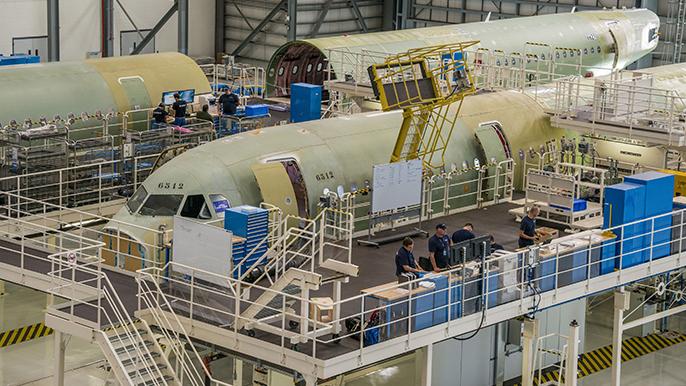
U.S. President Donald Trump has been busy racking up detentes lately, from a “phase one” trade war truce with China to a bipartisan budget agreement with Democrats in Washington. While each of these is important for the aerospace and defense sector, another potential thaw is gaining attention for being possibly more than just a ceasefire.
For 16 years, Airbus, Boeing, Europe and the U.S. have been warring in the World Trade Organization (WTO) over government subsidies to the OEMs that make large airliners. Both sides have won in court, and last year Washington got the green light to collect up to $7.5 billion in penalties. But by May or June, the WTO will announce how much Europe can collect in return.
With that deadline looming, Boeing and the Trump administration recently offered both carrots and sticks to try to nudge Airbus and the EU toward a settlement. First, the administration announced on Feb. 14 that the tariffs applied to large commercial aircraft from Europe imported into the U.S. will rise from 10% to 15% on March 18.
Second, new legislation was introduced for consideration in Washington state that would dial back tax benefits to Boeing worth about $100 million a year. “Boeing applauds the actions today by Washington state leaders to introduce this legislation,” the company said Feb. 19. “We fully support and have advocated for this action.”
Boeing said the legislation, if enacted, would “resolve the sole finding against the United States,” although the WTO would rule on that, and Airbus can dispute the ruling in a process that could take a year to play out. In a separate, parallel case that ended last year, Airbus undertook similar actions to unwind illegal subsidies. The company argued it was shutting down the A380 program, which would obviate the need for subsidies, but Boeing successfully fought that part of the argument.
Nonetheless, in order for the new legislation to matter, it ostensibly would have to become law first. Also, withdrawal of the tax benefit is not the same as making up for the harm the benefits might have done in the past. “It is unclear what impact the move will have,” JP Morgan analysts say about the legislation.
Similarly, the tariff increase to 15% is not expected to have an immediate effect. The initial implementation of the 10% penalty last year was seen mostly as a political warning shot. Indeed, U.S. specialty food and wine sectors have complained more loudly about the immediate impact on their businesses since the U.S. tariffs were implemented.
Still, the legislation affirms a relatively new desire by Boeing and the administration to try to craft some kind of a deal. Conditions have changed dramatically from the beginning of the dispute, which the U.S. kicked off at the WTO during the administration of former President George W. Bush. Boeing used to favor seeing the WTO process fully carried out and had deflected long-running Airbus entreaties to talk about an agreement. But that was before a China trade war, let alone the 737 MAX crisis or the COVID-19 outbreak.
It also came before Boeing tried to acquire 80% of Embraer’s commercial aircraft business—an acquisition that is being held up by EU antitrust regulators who live in the real world and read the same news about the WTO dispute and other EU-U.S. trade tiffs.
Of course, Airbus has good reasons to support a settlement. Analysts at Bloomberg have noted that even with tariffs on U.S. aircraft imports to Europe, Boeing still will be less harmed than Airbus by the whole dispute, as the latter’s sales into the U.S. could be more important, comparatively.
“Without a deal to lift U.S. tariffs in 2020, Airbus will need to absorb costs on 49 aircraft or reduce deliveries, as we see it,” Bloomberg analysts said Feb. 18. Airbus will soon be able to build six A320s a month in Mobile, Alabama, avoiding the U.S. levy on 72 deliveries this year, but that is all. Airbus is trying to backload its backlog with the hope that U.S. tariffs will eventually be lifted. If not, Airbus would lose up to about $300 million in pretax earnings this year, the company says.
“In a U.S.-Europe trade battle over airplanes, Airbus has more to lose, in our view,” the Bloom-berg analysts said. “All the fast-growing U.S. airlines purchase Airbus jets, including Frontier, Spirit, JetBlue, Allegiant and Delta.
European levies on Boeing products could have less of an effect. According to Bloomberg, American has a split buy of A320s and 737s. In Europe, Boeing’s biggest risk is Ryanair, with an all-737 fleet. Other large Boeing fleets such as Norwegian are outside the EU, and a number of lessors have orders—though they can likely take deliveries at subsidiaries in other jurisdictions.
“It’s also unclear whether the UK would place tariffs on U.S. aircraft as it leaves the European Union,” the Bloomberg analysts continued. International Airlines Group has a large letter of intent for Boeing 737s from last year’s Paris Air Show, which has yet to be confirmed. Those deliveries might not be affected if the UK does not follow suit on tariffs.
To be sure, a potential settlement in the airliner dispute could be derailed by any number of things. It depends on how much the WTO allows to be collected in penalties, how the EU implements its levies, or other issues such as the Boeing-Embraer deal and how Trump reacts.
For now, hope springs eternal. “There is a possibility that this trade dispute could escalate before peace breaks out, but Boeing’s recent moves on its Washington state tax breaks suggest that things are moving on the U.S. side,” say analysts at Vertical Research Partners.



Comments